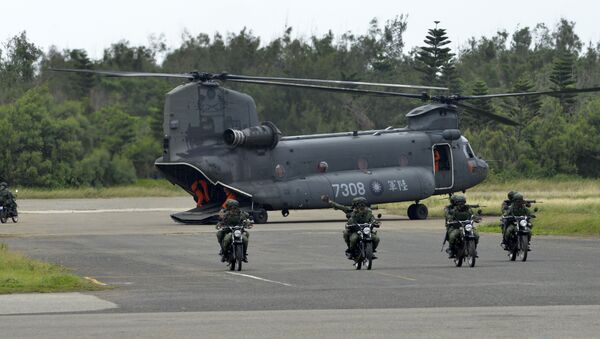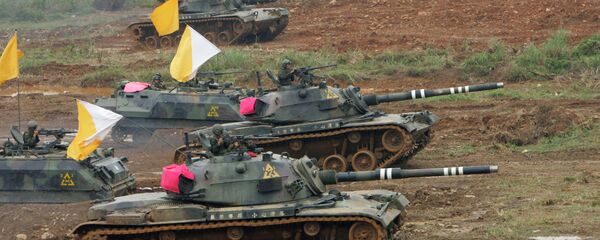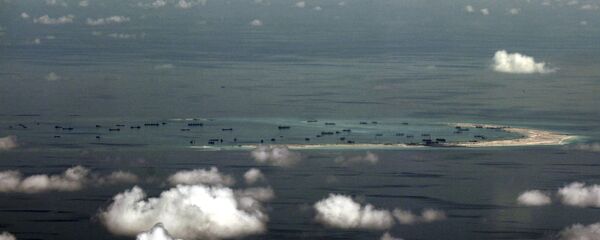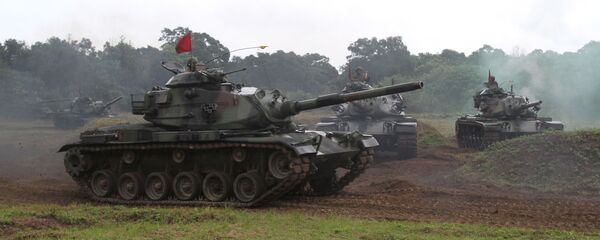The deal includes deliveries of anti-radiation missiles, heavyweight torpedoes, components for SM-2 missiles and air-to-ground missiles.
On Friday, Chinese Foreign Ministry spokesman Lu Kang said that by selling weapons to Taiwan, the United States was violating its international rights.
China strongly protests US arms sales to Taiwan — The Hindu https://t.co/Sxip62pxfO #IndiaNews
— TuuBol News Opinion (@tuubol) 1 июля 2017 г.
"China has already lodged protests with the US side here in Beijing and in Washington. Taiwan is an inseparable part of China. By selling arms to Taiwan, the Unites States gravely violates the international rights and fundamental principles of foreign relations," Lu said.
State Department spokesperson Heather Nauert, for her part, said that Trump's administration does not aim to make any changes to its "One China" policy despite its proposed arms sales to Taiwan.
"There is no change, I should point out, to our long-standing 'One China' policy. There is continuity here; the United States has been doing defense sales with Taiwan for 15 years or so," Nauert said.
Experts warned that the resumption of US arms supplies to Taiwan will ride roughshod over the dialogue between Taipei and Beijing and will lead to the escalation of military and political tension in the region.
RT quoted Russian political analyst Dmitry Streltsov as saying that it is the internal political situation that may influence the White House's decision on US arms sales to Taiwan.
Streltsov recalled that "[US President] Trump's positions were somewhat shaken as a result of recent political scandals, and he is now under fire."
What’s inside Taiwan’s US$1.4 billion arms dealhttps://t.co/hvWffG5Zeb
— Chinchew Palsu (@ChinchewPalsu) 1 июля 2017 г.
"He tries to improve his approval rating with the help of tough foreign decisions. Taiwan in this respect can be seen as a convenient testing ground. In addition, the Republican Party has always adhered to a tough position on Taiwan-related issues," Streltsov told RT.
Pyotr Tsvetov of the Russian Foreign Ministry's Diplomatic Academy, for his part, recalled that "there is an agreement between the United States and Taiwan, according to which Washington is obliged to ensure the security of the republic."
"I do not rule out that the US wants to strengthen its military presence in the region because of the strategic importance of the South China Sea for the supply of hydrocarbons from the Middle East," he said in an interview with RT.
US Approves First Arms Sale to Taiwan Under Trump https://t.co/OYMPsHD7nk
— Taiwan Sun (@taiwansun) 1 июля 2017 г.
Tsvetov explained that there are particularly influential political groups in Taiwan that support its reunification with China in line with the Hong Kong scenario as part of the "one country-two systems" strategy.
"US arms supplies to Taiwan will impede the peaceful dialogue between Beijing and Taipei and will support the separatist forces calling for Taiwan's independence," he added.
According to Streltsov, "Washington sends a signal to Beijing that the US intends to firmly uphold its own positions and the interests of its partners, and that allegations about Washington leaving Asia hold no water."
Since 1949, after Chinese Nationalist forces were defeated by Mao Zedong's Communists and the Nationalist government retreated to Taiwan, Beijing has viewed the self-ruling, ethnically Chinese island as a breakaway province.
After several years of thaw, Beijing suspended talks in May after Taiwan elected Tsai Ing-Wen to the presidency, a pro-independence candidate who refuses to publicly claim that Taiwan and China are one nation, as previous administrations did to begin the talks in the early 1990s.
Nevertheless, the issue of Taiwan in US-Chinese relations was raised again in December 2016 after then President-elect Trump had a phone call with Taiwan's President Tsai Ing-wen.
Trump became the first US president or president-elect to speak with a Taiwanese leader in an official capacity since the United States severed ties with the island nation.





